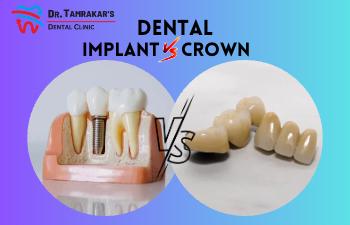Dental Implant and Dental Crown are both popular restorative dental treatments, but they serve different purposes and are used in different scenarios. Here's a comparison between the two: Dental Implant: Definition: A dental implant is a surgical component that is placed into the jawbone to replace a missing tooth root. It is typically made of titanium or titanium alloy. Purpose: Dental implants are used to replace a missing tooth entirely, including both the root and the visible crown portion. They provide a stable foundation for a dental prosthesis such as a crown, bridge, or denture. Procedure: The placement of a dental implant involves a surgical procedure, where the implant is surgically inserted into the jawbone. After a healing period of several months, a dental crown or other prosthesis is attached to the implant. Benefits: Dental implants are highly durable, long-lasting, and offer excellent functionality and aesthetics. They are known for their stability and feel like natural teeth. Candidates: Dental implants are suitable for individuals who have lost a single tooth, multiple teeth, or even all of their teeth. Sufficient bone density and healthy gums are essential for successful implantation. Dental Crown: Definition: A dental crown, also known as a cap, is a tooth-shaped restoration that covers the visible portion of a damaged or weakened tooth above the gumline. It can be made from various materials such as porcelain, metal, or a combination. Purpose: Dental crowns are primarily used to restore the function, strength, and appearance of a damaged tooth. They provide protection, support, and improve the tooth's aesthetics. Procedure: The process of getting a dental crown usually involves two visits. During the first visit, the tooth is prepared by removing the damaged or decayed portion. An impression is then taken to create a custom-made crown. In the second visit, the crown is placed and permanently bonded onto the prepared tooth. Benefits: Dental crowns are versatile and can address various dental issues, including severe tooth decay, fractures, large fillings, root canal-treated teeth, and cosmetic enhancements. They restore the tooth's shape, size, strength, and appearance. Candidates: Dental crowns are suitable for individuals who have a tooth with significant damage or decay that cannot be repaired with more conservative treatments like fillings or inlays/onlays. In summary, dental implants are used to replace missing teeth entirely, while dental crowns are used to restore damaged or weakened teeth. Dental implants are surgically placed in the jawbone and provide a foundation for prosthetic teeth, while dental crowns are custom-made restorations that cover and protect existing natural teeth. The choice between the two depends on the specific dental condition, the number of teeth affected, and the patient's preferences. It's best to consult with a dental professional to determine which option is most suitable for your particular situation.


